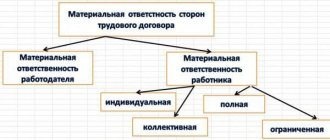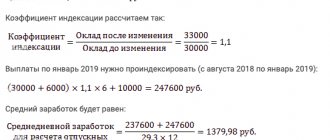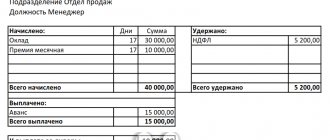Which legal regulations to rely on when drawing up a job description for a payroll accountant?
It should be noted that such a document as a job description is not provided for either by the Labor Code or related regulations at the federal level.
This source, despite its widespread use, is actually unofficial. However, most Russian enterprises still implement job descriptions into internal corporate document flow and establish regulations for their use in local regulatory legal acts.
A job description is a convenient and in many ways irreplaceable tool for interaction between an employer and employees. It spells out the bulk of their powers, rights, responsibilities, and establishes the mechanisms of responsibility to the employer. The employee, certifying that he has read the instructions with his signature (this procedure is standard for Russian enterprises), officially agrees with his obligations, which are stated in the relevant provisions of the document. At the same time, he gets the opportunity to enjoy the rights guaranteed by the employer.
In turn, the preparation of a job description may well be based on the provisions of certain legal acts, which reflect the specifics of professional positions. If we talk about the position of a payroll accountant, then to draw up instructions you can use the characteristics of the corresponding position recorded in the Qualification Directory of Specialist Positions, approved by Resolution of the Ministry of Labor dated August 21, 1998 No. 37.
Another important regulatory legal act, which can be a source of data for the formation of instructions for an accountant for calculating wages, is the order of the Ministry of Labor of the Russian Federation “On approval of the professional standard “Accountant”” dated 02.21.2019 No. 103n.
It is legitimate to talk about the mandatory nature of its application (Article 7 of the Law dated December 6, 2011 No. 402-FZ, Article 195.3 of the Labor Code of the Russian Federation, Decree of the Government of Russia dated June 27, 2016 No. 584):
- chief accountants of public joint stock companies, insurance companies, non-state pension funds, banks, non-credit financial organizations;
- outsourced accountants;
- accountants of budgetary organizations.
Based on the provisions of the regulations noted above, as well as the practically established features of the work of accountants of the corresponding profile, we suggest that you draw up a job description for a payroll accountant, presented below.
All about the position of accountant
An accounting employee is required to perform functions related to the payment of wages to employees of the enterprise. They are:
- Reception and processing of documents on the basis of which accruals and deductions for wages are made. Sick leave, orders from the manager on bonuses for employees, vacation applications, writs of execution - this is the documentation with which the accountant works;
- Calculation of wages for company employees. Based on the working time sheet, the specialist calculates earnings and accrues funds. In addition, the accountant withholds taxes and fees in accordance with current legislation;
- Making report. The employee prepares a report on the activities of the enterprise and sends it to the tax authorities, the Pension Fund of Russia, and the Social Insurance Fund;
- Accounting and storage of papers, certificates, constituent documents;
- Communicating with regulatory authorities during inspections, providing information on employee salaries to government agencies.
The job descriptions of a bookkeeper are not limited to this list. The specialist is obliged to closely monitor changes in the labor legislation of the Russian Federation and be aware of innovations in the Tax Code. Additionally, the accountant provides employees with the necessary certificates to apply to banks, medical institutions, and insurance companies.
In many organizations, an accountant combines his position with personnel work. In this case, the list of responsibilities includes maintaining personal files of employees, storing and filling out work books, forming seniority, applying for a job, and dismissal.
A professional accountant must have certain skills, knowledge and experience to carry out the activity correctly.
Accountant job description: title page
This instruction element must contain:
- an indication of what exactly the job description reflects (as a rule, these are the rights, duties and responsibilities of the employee);
- name of the employing organization;
- a note about approval by the manager;
- date of document preparation, signature and full name. head of the employing company;
- job description number.
Next, we will consider the key nuances of the sections of the instructions that are most typical for it. These are sections such as:
- general provisions;
- job responsibilities;
- rights;
- responsibility.
In addition, it would not be superfluous to include in the structure of the instructions sections regulating:
- the procedure for revising the provisions of the instructions;
- features of interaction between a payroll accountant and company employees (managers, executives) to whom he reports;
- the procedure for delegating the powers of an accountant during periods of his absence from the workplace.
Accountant job description: key nuances of the “General Provisions” section
One of the most important points in this section of the accountant’s instructions is the one that reflects the qualification requirements for a specialist in the relevant profile. The Qualification Directory of the Ministry of Labor, in particular, states that there are accountants of categories I, II, as well as accountants without a category.
In terms of qualification requirements, the former must have a higher education and 3 years of work experience, the latter may have a secondary education, provided they have similar experience. Accountants without a category may have secondary education and no work experience, or special training in their specialization and 3 years of work experience in the field of accounting and control.
In turn, Order No. 103n of the Ministry of Labor of the Russian Federation requires the compliance of the accountant whose competence includes payroll calculations with the 5th level of qualification and labor function A/02.5, within which the specialist carries out monetary measurement of accounting objects, as well as the current grouping of facts of economic activity.
It may be noted that the requirements for the level of education for a payroll accountant in Order No. 103n are less stringent than in the Qualification Directory. In particular, this legal regulation states that for an accountant of this profile to comply with level 5, it is enough to have a secondary vocational education or additional education through special programs. Also, to qualify for level 5, an accountant must have at least one year of experience for positions with category I or II in positions with a lower category.
One way or another, the position of payroll accountant at an enterprise requires a fairly high level of professionalism, which, first of all, must be confirmed by the education received or sufficient work experience.
Salary calculation rules are taught in almost all types of specialized educational institutions that provide training in accounting specialties - both higher and secondary. Therefore, in the relevant paragraph of the instructions it is permissible to indicate that a specialist with both higher and secondary education can be appointed to the position in question. In turn, the instructions can reflect the enterprise’s readiness to hire a person without special education, but who has completed the necessary training course and has the necessary experience in the field of accounting.
As for the range of required knowledge of an accountant, they in the instructions may be the same as those listed in the Qualification Handbook. These requirements generally adequately reflect the specifics of the position of payroll accountant. Here we state that a specialist of the relevant profile must know, in particular, the laws of the Russian Federation in the field of accounting, the Labor Code of the Russian Federation, local regulations, accounting procedures according to the chart of accounts, correspondence between accounts, labor protection rules, etc.
Options for creating a job description
In business practice, the following instruction format is more common:
Main sections:
- General information.
- Job functions.
- Official rights.
- Possible liability.
Sometimes additional sections are added to these required sections. This is especially true when drawing up instructions for management positions in large companies, when the employer wants to clarify some work parameters. The most popular additional parts:
- Working conditions.
- Official reports.
- Performance measurement parameters (KPIs).
Attention!
When drawing up instructions, professional standard 08.002 “Accountant”, approved by the Ministry of Labor at the end of 2022, can be used. It includes a general description of the accounting profession.
General information
The introductory section of the instructions is necessary to document general aspects. It describes the principles of temporary replacement of an employee, his hiring and dismissal, the order of subordination, etc. A special role is played by the qualification parameters listed in the section: level of education, work experience, specialized skills. They help ensure that a specialist is hired who is ready to perform the required work activities at a good level.
Attention!
In the accounting profession, it is important to be able to manage specialized programs, as well as reference and legal systems. These required skills should be mentioned in a separate paragraph.
Job responsibilities
This part documents what tasks the employee must perform. Often this includes not only specialized duties, but also of a general nature: working with documents, consulting other employees, replacing colleagues. In addition, the employee’s obligation to comply with the standards established by the employer is separately stated:
- maintaining order,
- compliance with confidentiality, security, and so on.
Responsibility
Issues related to the employee’s responsibility for his violations are beyond the scope of the instructions. This is due to the fact that the regulatory framework in accordance with which a decision is made on the guilt and punishment of an employee is complex and voluminous. Added to this are nuances related to evidence, testimony, and the actions of lawyers if the case is heard in court. Therefore, the section is limited to a general list of employee responsibility parameters.
Rights
This section lists official rights, the scope and significance of which depend on a number of factors:
- company personnel policy,
- scope of issues to be resolved
- and industry specifics.
It also includes certain job-specific rights. Therefore, it is important that accountants have access to specialized legal reference systems and current versions of accounting programs, which must be provided to them by the employer.
After drawing up the initial version of the instructions, the procedure for its approval begins. Typically it includes:
- lawyer – checks the project’s compliance with current legislation;
- employee – checks compliance with the rules for preparing business documentation in the instructions;
- HR manager – checks compliance with the parameters of the working documentation in the instructions.
Accountant job description: what to include in the “Job Responsibilities” section?
Based on the practice of payroll accountants, it makes sense in their job description to reflect the need for a specialist to perform such duties as:
- control over primary documents used in payroll calculations;
- reflection of information about wage-related transactions in accounting accounts;
- calculation of contributions to the budget for taxes and social contributions;
- issuance of 2-NDFL certificates and other documents related to wages at the request of employees;
- development of document forms for accounting of salary-related transactions;
- generation of reporting - accounting, tax, salary-related;
- performing work in compliance with the legislation on the protection of personal data, as well as the provisions of local regulations establishing the need to maintain confidentiality of information.
Also in this section of the instructions you can reflect the accountant’s obligation to timely transfer (for example, in the case of a business trip) his functions to replacement specialists.
Suppose there are several payroll accountants at the enterprise. Is it permissible to draw up one job description for this position or are instructions required for each employee? Sign up for a free trial access to ConsultantPlus and read the expert’s answer, which will allow you to comply with the Labor Code and not receive a fine.
How an entrepreneur can look for an accountant, part 1: responsibilities, salary, selection criteria
First of all, you need to understand what tasks you want to entrust to an accountant. For example, he can:
- check and prepare documents for counterparties: acts, invoices, invoices;
- work with the bank: generate payment orders, download statements, track cash balances;
- maintain tax records, prepare and submit tax reports;
- calculate employee salaries, income taxes and insurance premiums;
- keep records of property;
- maintain personnel records;
- draw up cash and other transactions if, due to the size of the business, you decide to keep accounting, as in organizations: use a chart of accounts and draw up primary cash documents.
Consider the specifics and size of your business. For example, one entrepreneur’s entire task consists of calculating and paying salaries to three employees twice a month. And another needs to keep daily records of trucking, wholesale trade and three retail outlets. Here's what else you need to pay attention to when you determine your task list and scope of work:
- number of daily transactions: how many acts, invoices, delivery notes, invoices, payment orders need to be issued.
- number of full-time and remote employees.
- availability of property at the enterprise;
- tax regimes and their number;
- number of activities;
- the need to combine positions: for example, accountant-cashier, accountant-HR officer.
When the tasks and scope of work are clear, you need to decide how experienced an employee you need, what his work schedule and salary will be. You need to immediately understand how you will formalize your relationship with an accountant.
Education and work experience
To calculate salaries and calculate simplified taxes, an applicant only needs to have a specialized secondary education or complete accounting courses, then work for one or two years. But if you have a production facility, you pay VAT and purchase products from abroad, it is advisable to look for a specialist with a higher education and at least five to seven years of experience in your field of activity.
However, experience should not be the main selection criterion. For example, a full-time accountant who has worked in one accounting area for 20 years has a very limited set of knowledge. On the other hand, a freelancer with five years of experience may know much more if he has a wide area of activity.
Schedule
An accountant can work full-time or part-time, in the office or remotely. For example, if an entrepreneur conducts a wholesale trade with a large number of goods coming in and out every day, most likely an accountant will be needed full time. If an entrepreneur organizes transportation and issues reports to customers at the end of the month, the accountant can come to the office once a month.
Salary
View average salaries for general and specialist accountants in your region. If you need an employee to maintain full accounting and tax records for your enterprise, focus on the salaries of chief accountants of small enterprises. To understand how much you need to pay a specialist, focus on the salaries of site accountants: for payments to suppliers, for payroll calculations. To determine the cost of remote accountant services, look at the average prices for specific work. For example: how much does it cost to prepare quarterly reporting for employees? Do not forget to take into account income tax, since in advertisements applicants often indicate the “net” income that they plan to receive in their hands. As well as the amount of insurance premiums that you will pay for an accountant to the budget.
Such calculations will help you predict expenses and weed out candidates who inflate the cost of their services.
It is better to resolve the issue of employment procedures before starting the search for an employee. You can enter into a civil law agreement or an employment contract. Typically, civil contracts are concluded with remote accountants for a specific scope of work. For example: fill out a book of income and expenses, calculate taxes for the quarter, prepare reports. This option has its advantages:
- there is no need to provide vacation, pay sick leave, work on holidays and weekends, transfer contributions to the social insurance fund, pay compensation upon dismissal;
- no need to fill out and maintain personnel documentation: orders, personal card, work book;
- it is easier to terminate a relationship: the Civil Code does not establish prohibitions on termination of cooperation;
- If the contractor violates the terms of the contract, it will be possible to recover damages, penalties and lost profits from him. According to the employment contract, the employee only compensates for actual damage.
On the other hand, you cannot enter into a civil contract if you pay not for the result, but for the process of fulfilling duties. Payment for performing duties is one of the signs of labor relations listed in Articles 15, 56, 57 of the Labor Code. Here are a few more:
- the contract specifies the employee’s workplace, indicates the work schedule and rest time, and provides a list of labor actions;
- the employer provides working conditions: equips the workspace with furniture, provides computer equipment, office supplies, accounting programs, reference and legal systems, pays for advanced training courses;
- the employee performs work under the direction and control of the employer.
If you plan to load an accountant with permanent work, and not engage him to perform specific tasks from time to time, enter into an employment contract.
Important! If your accountant will perform the functions of a cashier, then you cannot sign a civil contract with him. Cashier is a position to which only an employed employee can be appointed, the basis is clause 4 of Bank of Russia Directive No. 3210-U dated March 11, 2014.
You can look for a specialist yourself or through a recruitment agency. If your business is still at the start and you cannot afford additional expenses, try to do it on your own.
Start your independent search by asking your friends. If you doubt the competence of the proposed candidates or there are none at all, look for an accountant on the Internet. Job seekers who are looking for a permanent job under an employment contract more often post their resumes on HeadHunter, Rabota.ru and other human resources. Remote specialists actively advertise their services on freelance websites: Profi.ru, FL.ru and on popular message boards: Avito, From Hand to Hand. Another option is social networks. Create an ad on your personal page and in your company group, if one exists.
In the title, indicate what kind of accountant you need: for example, HR accountant, payroll accountant, chief accountant. Next, tell us about your business: what industry, are there any specifics. Explain why the vacancy appeared: for example, no one has previously held the position, or the previous employee is going on maternity leave, but will transfer cases as long as necessary.
Make a list of tasks, indicate the approximate workload, tell us about your requirements for candidates. Indicate the accountant's qualifications that match the needs of your business. For example, if you need someone to do payroll, don't ask them to know financial analysis. Divide the requirements into mandatory and desirable. A good specialist quickly assimilates the necessary information; he can learn the small specifics of your business as he works.
Please indicate your expected pay level. Make realistic requests: the accountant’s income must correspond to his qualifications and the volume of work performed. Otherwise, you risk hiring an incompetent employee. And then the financial losses from fines from regulatory authorities can many times exceed the savings on decent remuneration.
Some resources, such as HeadHunter, allow employers to only accept applications with a cover letter: this helps weed out those who apply to all positions and are not particularly interested in the job. You can also make a mandatory test task with questions about work experience, desired remuneration and other nuances. This approach reduces the initial selection of candidates.
So, you have looked through the responses and selected specialists based on basic characteristics: education, work experience, expected income. Take a closer look at the following details.
In what areas did the accountant work? Traditionally, production is considered the most difficult area of activity. A production accountant can easily conduct both trade and services. But a specialist from the service sector may not be able to handle production.
What taxation systems did the accountant work with? Special modes are easier to administer. If you work in a general tax system, a special accountant will not be suitable for you.
Does the applicant have experience in passing inspections? Today, not a single business is immune from inspections by government agencies. Experience interacting with controllers is very important.
Does the applicant know specialized programs for running your business? An accountant must know the program in which you plan or already keep records, be able to work with reference and legal systems, Internet banking, and have experience in transmitting electronic reporting through operators or through government service portals.
How long did the accountant work for previous employers and when did he usually quit? If the applicant rarely worked in one place for more than a year, and usually quit in March, this is an alarming sign. Perhaps you have an incompetent employee and because of him, previous employers had problems with the final reports: they are submitted by March 31.
Are references included with the resume? Good accountants are usually willing to provide written references or provide a phone number of a past employer to request a reference. Remote professionals typically provide feedback from service customers.
Make a list of tasks for the accountant and think about what the scope of work will be. Decide what the employee’s qualifications should be, what schedule he will work on, and how much you will pay. Start your search: you can also contact a recruitment agency, but in any case it won’t hurt to search on your own. If you are looking for an accountant on a permanent basis, create an advertisement on human resources, for example, on HeadHunter and Rabota.ru. If you need a freelancer, look for him on freelance exchanges: Profi.ru, FL.ru. Create a post on social networks: on your personal page and on your company page, if you have one. Study the responses and weed out unsuitable candidates: select a specialist whose qualifications, skills and level of knowledge meet your needs.
In the next part we will tell you how to conduct an interview, how to conclude an agreement and monitor the work of an accountant.
The rights of an accountant reflected in the job description
The instructions also recommend reflecting the rights of the payroll accountant:
- for assistance in the implementation of labor functions from the head of the employing company and other managers;
- making personal decisions within the limits of available authority;
- internal corporate information exchange and negotiations with employees of other divisions of the company in order to resolve current work issues;
- obtaining information about necessary internal corporate resources, including those that constitute a trade secret, if this is necessary to solve current problems;
- submitting proposals for optimization of their work and the enterprise as a whole to the management bodies of the company for discussion.
Note that in many enterprises, a payroll accountant can directly participate in the discussion of business development prospects at the senior management level. In this case, this possibility is usually recorded in the list of specialist rights reflected in the instructions in question.
What should a payroll accountant be responsible for according to the instructions?
The next most important section of the job description for a payroll accountant is “Responsibility.” It is recommended to indicate that a specialist of the relevant profile is responsible for:
- for incorrect performance of their duties approved by the instructions;
- causing material damage to an enterprise within the limits established by the Labor Code of the Russian Federation;
- offenses committed in the course of work, within the limits established in the legislation of the Russian Federation;
- violation of rules for working with confidential data and documents;
- violation of the labor regulations of the employing company, various rules and safety standards.
The document can also include a clause such as revision of instructions, reflecting the fact that instructions can be revised every five years. This is secured by a separate order; The accountant and other employees subject to the jurisdiction of the document must familiarize themselves with it against signature.
At the end of the job description, it would be useful to make a note that the document was developed in accordance with the order of the head of the company.
Responsibility
This is another section of the job description that warns the accountant of responsibility for failure to comply with certain points of the instruction.
According to it, the employee will be responsible:
- within the limits of current labor legislation - for improper performance or failure to fulfill the duties assigned by the job description;
- within the framework of labor and civil legislation - for material damage caused;
- within the framework of criminal, civil, administrative legislation - for offenses committed in the performance of official duties;
- for failure to comply with labor and performance discipline.
There are different types of accounting employees, and they all have different job descriptions. Read about the job descriptions of an assistant accountant, materials accountant, human resources accountant, leading accountant, and cashier accountant.
Results
The job description for a payroll accountant is a document that is similar in structure to other sources of similar purpose. However, it is necessary to reflect a number of provisions that are primarily characteristic of the position of payroll accountant. These are present in each of the sections of the document we examined.
You can study other aspects of personnel records management at an enterprise in the articles:
- “HR administration from scratch - step-by-step instructions”,
- “What is the storage period for personnel documents in an organization?”
You can find more complete information on the topic in ConsultantPlus. Free trial access to the system for 2 days.






